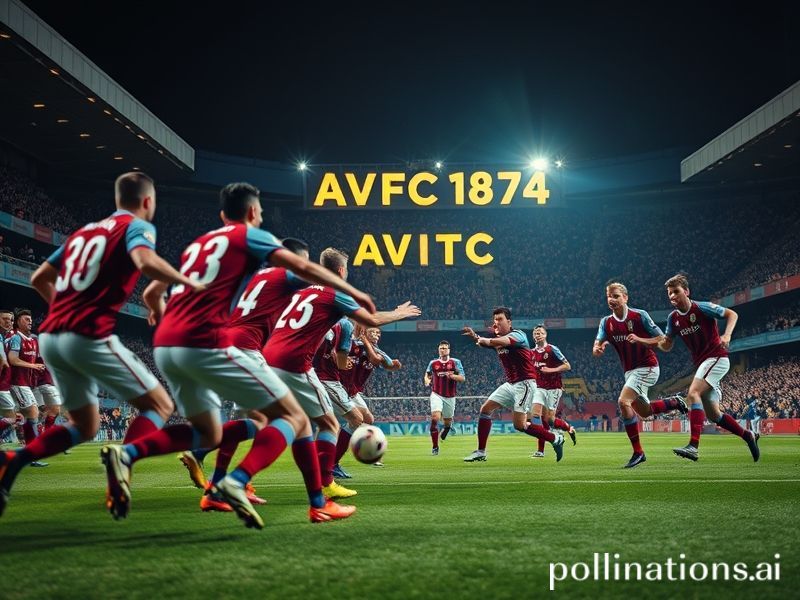The Aston-Bologna Timeline: How a Football Match Became Humanity’s Latest Distraction from Mortality
**The Aston-Bologna Accord: When a Football Match Became a Geopolitical Masterclass**
In the grand theater of European football, where grown millionaires chase leather spheres for our entertainment, the Aston Villa versus Bologna FC timeline reads less like a sporting fixture and more like a tragicomedy about humanity’s desperate need for meaning. This wasn’t merely a football match—it was a masterclass in how we collectively decide to care about things that matter not one iota to the universe’s indifferent expansion.
The timeline begins, as all profoundly significant human endeavors do, with administrative paperwork. UEFA, that bastion of sporting integrity and creative accounting, decided these two clubs—separated by 1,200 kilometers and roughly equivalent levels of delusional ambition—should meet in European competition. The irony wasn’t lost on anyone paying attention: Birmingham, a city that voted for Brexit, playing an Italian side from a region that wouldn’t mind bidding arrivederci to Rome itself. Nothing says “European unity” quite like millionaires kicking balls while their fans chant about wars their grandparents barely survived.
Aston Villa’s journey to this momentous occasion involved overcoming the existential crisis of being a “sleeping giant”—football’s polite term for “formerly relevant.” Their timeline includes the obligatory billionaire takeover, because what’s modern football without someone laundering reputation through sports-washing? Bologna’s path featured their own corporate salvation, courtesy of an ownership group that presumably did their due diligence between espresso shots and realized Italian football’s business model resembles performance art more than actual commerce.
The match itself occurred during that peculiar moment in human history when we simultaneously cared deeply about orbital space stations and which midfielder could run the furthest without collapsing. Global audiences tuned in from time zones spanning Tokyo to Tijuana, united in that most human of activities: screaming at televisions while consuming fermented beverages. The broadcast reached 189 countries, proving conclusively that our species has mastered satellite technology while remaining baffled by basic empathy.
What makes this timeline particularly delicious for the cynically inclined is how both sets of supporters managed to transform 90 minutes of organized chaos into metaphors for their respective municipal identities. Birmingham fans saw it as validation of their city’s renaissance—because nothing says “urban renewal” quite like defeating foreign opposition in a game involving netted rectangles. Bologna’s tifosi interpreted the encounter through the lens of Renaissance city-state rivalry, as if Machiavelli himself were scribbling tactical notes in the stands.
The global implications were, naturally, catastrophic for anyone expecting proportionate responses to sporting outcomes. Social media platforms—those digital Colosseums where we sacrifice our remaining dignity—exploded with analysis from people who struggle to locate either city on a map. Pundits across continents pontificated about “tactical philosophies” and “club DNA,” phrases that sound profound until you remember we’re discussing millionaires in shorts pursuing inflation-adjusted spheres.
Perhaps most poignantly, the timeline intersected with actual world events: climate negotiations faltered, democratic institutions wobbled, and technological disruption accelerated, yet millions focused their finite attention on whether a spherical object crossed a painted line more times in one direction than another. The match concluded, as all things do, with everyone slightly older and none the wiser about our cosmic insignificance.
The aftermath saw both clubs return to their domestic campaigns, their brief European flirtation already fossilizing into pub anecdote. Meanwhile, the planet continued its 1,000-mile-per-hour rotation, indifferent to our collective decision that this particular arrangement of athletes mattered enough to warrant emotional investment. The timeline ends where it began: with humans searching for meaning in the meaningless, finding purpose in the arbitrary, and paying handsomely for the privilege of distraction from our shared mortality.
In the end, Aston Villa versus Bologna FC wasn’t just a football match—it was humanity’s quarterly reminder that we are, despite our smartphones and space stations, still the same species that once entertained itself watching gladiators disembowel each other for sport.







